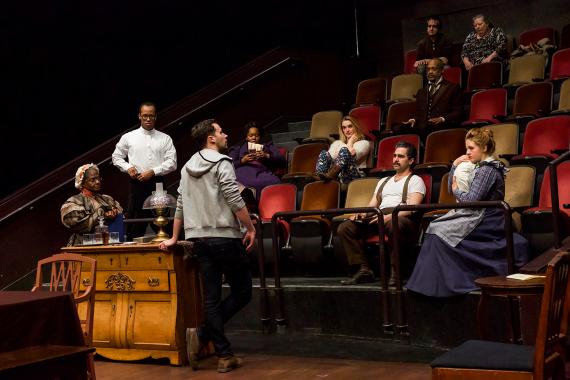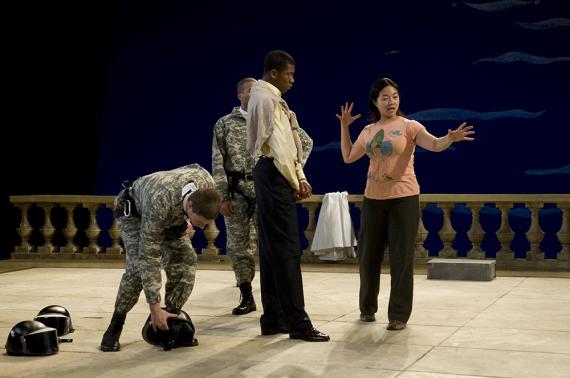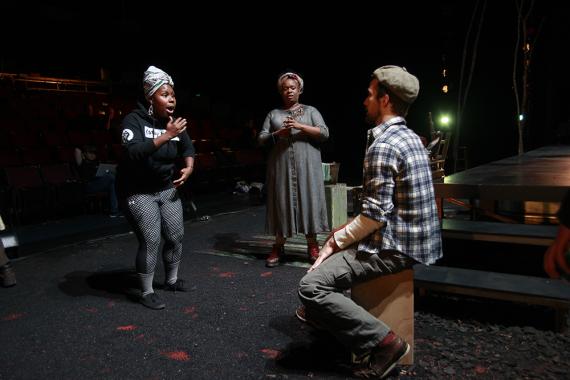
The Professional Director Training Program
"Our directing program is built on three key questions: What lights you up? (PASSION); What is the impact you want your work to have in the world? (VISION); What are the skills that you need to land your work on an audience? (CRAFT)"
- Valerie Curtis-Newton, Directing Faculty
Overview
The Directing Program fosters the talents of exceptional theater directors looking toward the past, present, and future of theater. With training spanning playwright-centric and generative processes, we seek directors who are creative engines of the projects they undertake and demonstrate passion, resilience, leadership, and collaboration. Successful candidates will have a strong instinct for visual storytelling, work collaboratively with actors and designers, have articulated passions for ideas, language, visual art, and music, and possess solid foundations in dramatic literature and theory.
Our course of study is a rigorous, three-year, hands-on program designed to prepare students for a variety of successful entry paths into the profession with a multifaceted set of tools. Students will work closely with faculty to develop their unique artistic voices and mission while also being given opportunities to develop the practical skills necessary to reveal the potential of any text/story/event. Our program expects mastery of scripts across realistic, classical, and contemporary styles as well as experience generating work in devised settings with ensembles of actors and designers. Students will take classes in a vast array of topics including directing craft, design, acting, dramaturgy, and professional development. MFA directors will also direct each quarter in a lab classroom, studio, or full production setting.
Our goal is to prepare directors for their future by exposing them to current industry practices while simultaneously nurturing the innovation and entrepreneurship that will allow them to broaden the field beyond what’s currently known.

Program of Study
In order to optimize contact with all of our performance faculty the following courses are the required core for each quarter for the first two years:
- Directing Lab
- Directing Seminar
- Design Studio
- Acting Process
- Physical Training
- Production
View Sample Curriculum
Directing Lab is where one of the Directing faculty works with directing students and actors two to three times per week. Our assumption is that graduate actors, designers and directors gain a great deal by doing studio work together as if in rehearsal, supervised by qualified master teachers. Since interaction between directors, actors and designers is a crucial dynamic of a director's professional career, the faculty consider it important to provide a creative crucible, in a lab setting, for the necessary skills and sensibilities to develop.
Directing Seminar provides the opportunity to examine upcoming and current student-directed productions and then review the results. Additionally text analysis, staging ideas, adaptations, new scripts, and collaboration with other specialists are covered.
Acting Studio, which, when time allows, includes student directors, includes Stanislavski, action theory, Shakespeare, Chekhov and contemporary realism. The focus of acting process classes is to develop processes in both acting and directing students which they can then apply to a wide variety of scripts and situations.
Suzuki based physical training and Viewpoints are taken by all of the graduate acting and directing students every quarter. The work is a lab for addressing physical foundations of acting process and the full involvement of the body in space. It includes elements of tempo, concentration, power, and the relationship of real and imagined elements on the stage. We have found that directors develop useful diagnostic skills through physical experience and active observation of the physical training.

Production
Every quarter each student directs in the classroom, studio or both. Plays are selected in conjunction with the faculty and the length and nature of the project will be determined by each student's pedagogical needs at the time. On occasion directing students serve as assistant directors to members of the faculty and/or visiting artists during their time at the School of Drama.
The principal studio for directing projects is room 218 in Hutchinson Hall, a 2,900 sq. foot space with movable seating risers to allow for a variety of stage configurations. Studio 218 has lighting and sound systems. Directors can also expect to work in at least 2 of the School's theatre spaces as part of the subscription season. The theatres' configurations are thrust, arena, and end stage.
In the second year each director directs a workshop production of a full length play in the School's subscription season. In both the first and second year each director may also direct in the annual short play festival. In the third year each student directs a fully-produced full length play as a thesis in either the winter or spring quarters. The casts for these productions are comprised of MFA and BA students and occasionally community actors.
Additional Coursework
After discussions with each student the faculty may advise additional coursework in such areas as Alexander Technique, Dialects, Lighting Design, Combat, Literature, History of Styles and Costume, etc.
All students are evaluated by all of the contact faculty each quarter.
